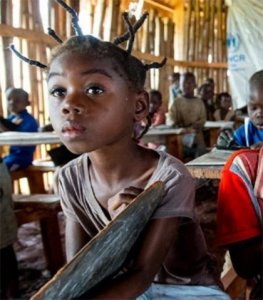Refugee kids could all get an education for just $5bn a year – World Bank
All refugee children living in host countries could receive educations at a cost of just $US4.85 billion a year, according to a new report by the World Bank and the UNHCR.
The ‘Global Cost of Inclusive Refugee Education’ report computed the cost of providing education to all refugee children in their host countries. It found this would cost US$4.85 billion pre-COVID, with the cost likely to increase due to the impacts of the pandemic.
 This is less than 5 per cent of what the developing, which host 85 per cent of refugees globally, already spend on public education.
This is less than 5 per cent of what the developing, which host 85 per cent of refugees globally, already spend on public education.
“The cohort-average annual cost of providing education to all refugee students in low, lower-middle and upper-middle income host countries is US$4.85 billion,” the report says.
“The total financing envelope required to provide K-12 years of education over a 13-year period to 2032 is US$63 billion,” it says.
The Global Compact on Refugees (GCR) has placed enhanced responsibility-sharing at the
centre of the international refugee protection agenda.
It commits stakeholders to specific measures to achieve that goal, including a proposal to measure their contributions.
The report notes that that education in emergencies is not only a humanitarian crisis but also a development crisis with large numbers of refugee children spending their whole education life cycle in displaced settings.
“These environments are often already stretched to deliver quality education services. Eighty-five percent of the world’s displaced persons are hosted in low and lower middle-income countries,” it says.
Where refugees are concentrated in border or rural regions, inclusive education systems can direct resources to previously underserved areas in host countries, the report says.
It says inclusive national education systems promote a streamlined response to the large influx of refugees by building resilient systems with benefits for refugees and host communities alike.
This creates a framework for the international community to harmonize efforts and share the collective burden and responsibility of refugee education, the report says.
“The costing methodology developed (in the report) is based on the key premise that refugee education is embedded in the host country education system, facing the same cost drivers and efficiency and quality constraints,” the report says.
“This implies that refugee students receive an education that is “no better, no worse” than host country students in terms of teacher quality, school infrastructure, access to learning materials and other inputs,” it says.
“The average unit cost for refugee education is US$1,051. There are large variations by country income categorization: the average unit cost for refugee education in low, lower-middle and upper-middle income countries is US$171, US$663 and US$2,085 respectively,” the report says.
The report calls for improved data collection and reporting on refugee education, especially regarding demographics, the cost of refugee education programmes and how these evolve over time as the initial emergency response becomes a protracted situation, and the unit cost of public education in host countries.
“This will lead to improvements in the process of measuring the impact and contributions of host countries and make for more the accurate refugee education financing estimates,” it says.












